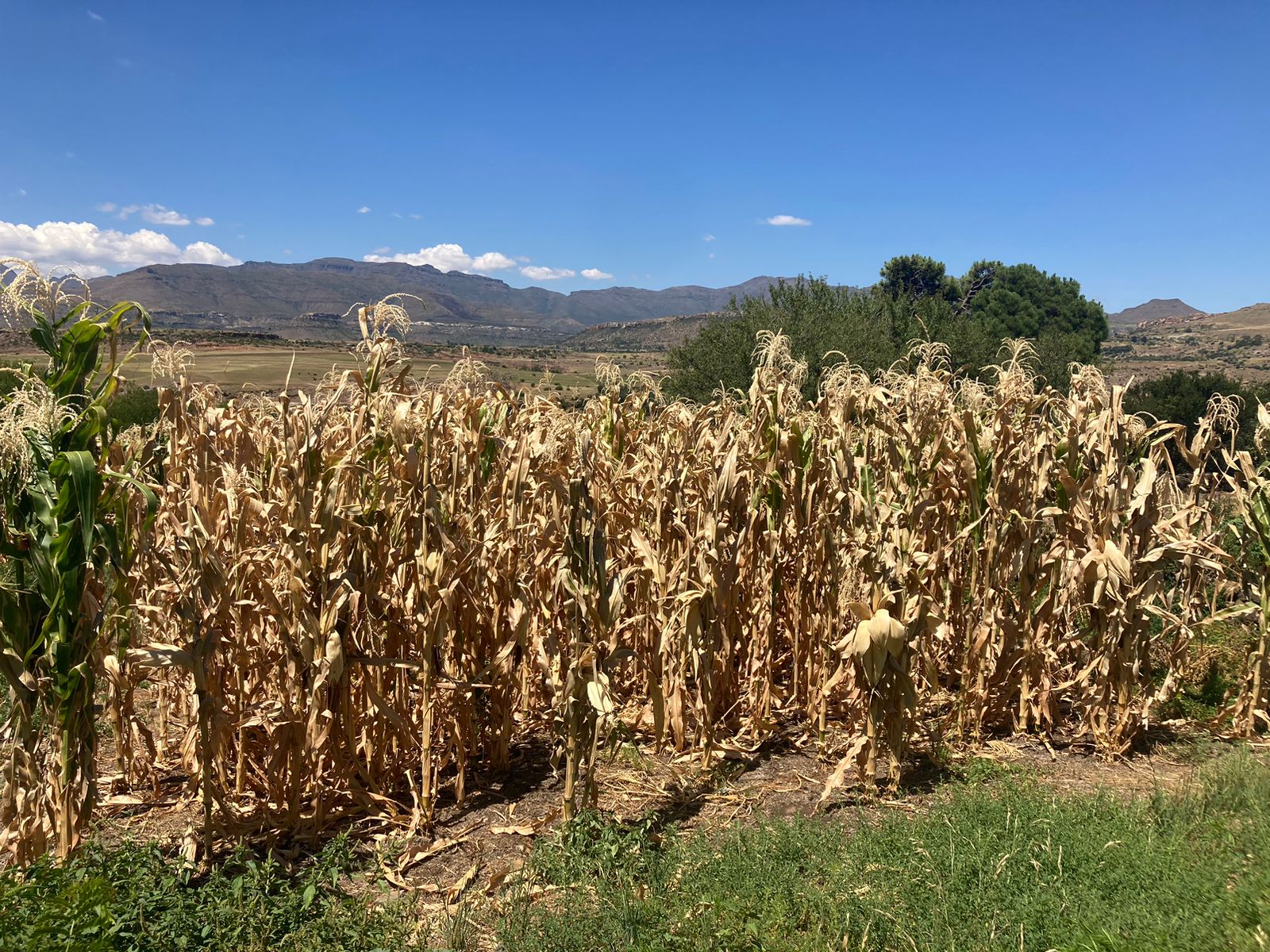Libuseng Molato
National Food Insecurity Disaster Declared
In response to the severe food insecurity crisis in Lesotho, Prime Minister Samuel Ntsokoane Matekane declared a national food disaster following the El Niño-induced drought. The drought has left an estimated 700,000 Basotho facing extreme hunger, with the government estimating that M1.2 billion is needed to address the crisis. The Prime Minister emphasised the urgency of the situation, calling for immediate action to mitigate the suffering.
In support of the Prime Minister’s appeal, His Majesty King Letsie III invited the three Rome-based United Nations agencies focused on food and agriculture to engage in collective action. In alignment with this, the Ministry of Agriculture organised a high-level dialogue titled, “Deepening Collaboration to Accelerate the Attainment of Sustainable, Resilient, and Inclusive Food Systems in Lesotho to Mitigate Future Shocks.”
UN Resident Coordinator’s Call for Collective Efforts
UN Resident Coordinator in Lesotho, Amanda Khozi Mukwashi, opened the dialogue by expressing heartfelt gratitude to His Majesty for his steadfast leadership and unwavering commitment to improving nutrition in Lesotho and globally. She acknowledged his role as the FAO Special Goodwill Ambassador for Nutrition, highlighting his influence in bringing crucial issues of food security and nutrition to the global stage.
Mukwashi underscored the importance of collective efforts and solidarity in addressing food security.
“The opportunities are massive against the challenges we have to overcome. I’m happy because we have what it takes to climb the mountains,” she remarked.
The latest findings from the Lesotho Vulnerability Assessment Report reveal a grim reality: close to 700,000 Basotho will face food insecurity in the 2024/2025 year, marking a 20% increase from 2023/2024.
Mukwashi emphasised the urgent need for action, stating, “When people go hungry, there is no peace. When children go hungry, there is no future.”
She called for inclusive efforts, ensuring that disadvantaged communities, including people with disabilities, receive equal opportunities to thrive. Mukwashi concluded by emphasising the importance of public-private partnerships and collaborative efforts in achieving sustainable solutions to food insecurity.
FAO Director-General’s Insights on Food Security
Dr. Qu Dongyu, Director-General of the Food and Agriculture Organization (FAO), provided a detailed overview of food security, defining it as encompassing food availability, accessibility, and affordability. He highlighted the three layers of the food pyramid worldwide: quality foods, nutritious foods, and healthy foods.
Dr. Qu praised the Lesotho government for prioritising food security, especially during the country’s 200th-anniversary celebrations. He noted that the high-level delegation from FAO, including three Assistant Directors-General, demonstrated the agency’s strong support for Lesotho.
Addressing the global context, Dr Qu cited the 2024 State of Food Security and Nutrition in the World (SOFI) Report, which revealed that more than 730 million people worldwide faced hunger in 2023.
He warned that without transformative change, 580 million people could be hungry by 2030, with Africa being disproportionately affected.
Dr Qu stressed the need for innovative, creative solutions to address the challenges facing agrifood systems. He called for collaborative efforts at all levels, from government to civil society, to build a resilient and sustainable food system in Lesotho.
Government’s Commitment to Agricultural Transformation
The Minister of Agriculture, Food Security, and Nutrition, Mr. Mofosi, emphasised that agriculture is a priority in Lesotho’s economy, despite its potential being underutilised. He noted that the country’s high poverty and food insecurity levels are linked to the loss of focus on rural well-being.
Mofosi outlined the government’s commitment to transforming agriculture from subsistence farming to a more commercial and competitive sector.
He acknowledged the challenges posed by Lesotho’s geographical and climatic conditions but stressed the importance of investing in irrigation and cheaper energy to support agricultural development.
Dr. Lefulesele Lebesa, Director of Livestock, highlighted the importance of commercialisation, supporting infrastructure, and technological advancements. She called for removing barriers to private sector involvement in agriculture, aligning with the National Strategic Development Plan’s priorities.
Embracing Technology and Innovation
Minister of Information, Communication, Science, Technology, and Innovation, Nthati Moorosi, discussed the potential of emerging technologies to improve sustainable agricultural systems.
She emphasised how digital platforms can connect farmers with markets, suppliers, and new technologies, reducing labour-intensive activities and enhancing efficiency.
Dr. Abebe Haile Gabriel, FAO Assistant Director-General and Regional Representative for Africa, echoed these sentiments, stressing the importance of water technologies in achieving better agricultural production.
He highlighted Lesotho’s potential to grow exotic fruits and vegetables, which could boost both domestic and international markets.
IFAD and Lesotho’s Joint Efforts to Boost Agricultural Investment
Donal Brown, Associate Vice-President for Programme Management at the International Fund for Agricultural Development (IFAD), reaffirmed IFAD’s commitment to supporting Lesotho in unlocking its agricultural potential. He announced a US$25 million investment in the Regeneration Opportunities Fund (ROF), a sustainable financing mechanism for land regeneration.
Brown emphasised the importance of investing in small-scale farmers and rural communities to create a more resilient and sustainable food system in Lesotho. He also highlighted the significant challenges posed by land degradation, soil erosion, and climate change, which disproportionately impact rural communities.
Field Visit and Policy Direction
During a field visit to Mahobong Fruits Farm in Leribe, His Majesty King Letsie III, along with the Rome-based UN Agencies’ representatives, explored the potential for commercialising agriculture in Lesotho. The visit provided insights into the opportunities and challenges facing the agricultural sector.
In his closing remarks at the high-level dialogue, Prime Minister Matekane expressed gratitude to the UN delegation and emphasised the need for a new policy direction in commercialising agriculture. He called for positive transformation and collaboration to ensure that Lesotho becomes food secure and resilient against future shocks.
Summary
- In alignment with this, the Ministry of Agriculture organised a high-level dialogue titled, “Deepening Collaboration to Accelerate the Attainment of Sustainable, Resilient, and Inclusive Food Systems in Lesotho to Mitigate Future Shocks.
- Addressing the global context, Dr Qu cited the 2024 State of Food Security and Nutrition in the World (SOFI) Report, which revealed that more than 730 million people worldwide faced hunger in 2023.
- He called for collaborative efforts at all levels, from government to civil society, to build a resilient and sustainable food system in Lesotho.

Your Trusted Source for News and Insights in Lesotho!
At Newsday Media, we are passionate about delivering accurate, timely, and engaging news and multimedia content to our diverse audience. Founded with the vision of revolutionizing the media landscape in Lesotho, we have grown into a leading hybrid media company that blends traditional journalism with innovative digital platforms.










